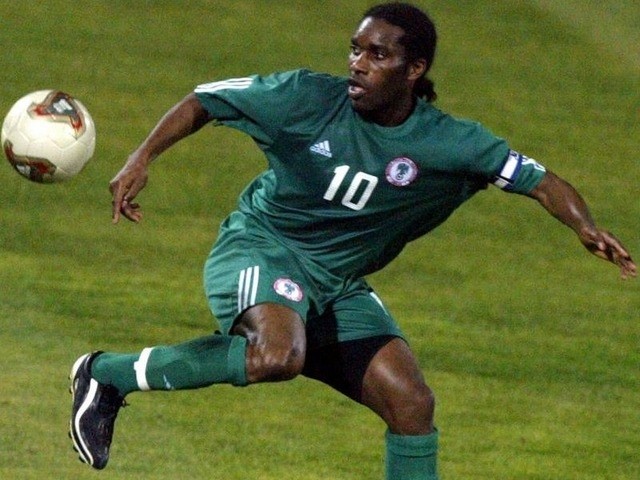 Jay Jay Okocha[/caption]
Jay Jay Okocha[/caption]
Aside from being perhaps the most outrageously gifted Nigerian footballer of all time, Okocha was a walking riddle, a moral and philosophical sticking point. In many ways, he ran counterpoint to the very fabric of the national worldview; hedonism is very much an acquired taste, and at that, a recent one.
Okocha embodied the very elevation of art as an end in and of itself, requiring no further pursuit or interpretation to validate it. His casual brilliance made him an elite dribbler, with his little repertoire of flicks and step-overs impish in their daring and worth the price of admission by themselves.
It is those memories that he conjures up, brief vignettes wherein, for a limited period only, the spotlight was on one man. It was intrinsically selfish and showy, but it made the heart jerk and the blood flow warm. Who can forget his utter embarrassment of German legend Oliver Kahn, prancing gaily around the penalty area, trailing defenders in his wake and leaving the goalkeeper flat on his buttocks repeatedly?
Advertisement
It is instructive that the things Jay-Jay excelled at required no external aid or support: he possessed a ferocious shot from distance, he perfected the art of free-kick taking, and varied the technique with insulting ease—striking the ball clean through, curling it in, even firing around the wall with the outside of his boot like against Aston Villa in 2004. He was also nerveless from the penalty spot, the take-away being that in a direct battle of wits with an opponent, he was impossible to suss out.
If football was an individual sport a la tennis, Jay-Jay would have been only too glad to oblige. Indeed, it often seemed like he needed to be reminded it wasn’t.
For all his moments of wizardry, Okocha was essentially a luxury car: stunning to look at and purring elegantly, but high-maintenance. It did not help that the Super Eagles were in a 4-4-2 phase for much of his prime. His hippie, free-loving, roving circus act across the pitch placed great demands on the rest of the team; consequently, Sunday Oliseh went through a tremendous amount of work covering the vast ocean he often vacated.
Elimination at the hands of Denmark at the 1998 World Cup was the perfect microcosm of the problems associated with having him in central midfield. Repeatedly, the Danes broke and overloaded Oliseh in the midfield zone, often with Okocha in a different zip code. It was an inescapable truth: against top class teams, defensive solidity was impossible with him in the team.
Advertisement
Ironically, and entirely in keeping with the player, nearly all of his highlight-reel film from that summer in France came as the rest of the team toiled at the Stade de France that night. Completely in his element and at his carefree best, he produced numerous devilries, most notably a fantastic drag and back-heel at the corner flag that drew an audible ‘ooh’ from the crowd; only trouble was he had given the ball away and the Danes were breaking in numbers.
He would eventually be tethered by the weight of the captain’s armband. Much like the Italian national team, the Super Eagles captaincy owes a lot to seniority, and following the banishment of Oliseh and Finidi George in 2002, the honour fell on Okocha.
Two years later, he produced his most complete, disciplined tournament display as Nigeria won bronze at the 2004 Afcon. It earned him four goals – a share of the tournament Golden Boot – and the tournament MVP nod.
It would be perhaps too convenient to chalk his newfound maturity to the captain’s armband alone. Perhaps the exuberance of youth simply burned itself out; he was, after all, in his thirties—the japes and mickey-taking had surely lost their novelty. However, it is noteworthy that he was also carrying the captaincy for Bolton Wanderers, then in the Premier League and turning heads under Sam Allardyce.
The very presence of the band provides a consistent reminder there are ten other individuals looking to the wearer for guidance; the ultimate individualist had lost the license to function oblivious to the rest of the team. The audacious skill was not gone by any means, but it was a lot less exhibitionist. Where once he would dribble because he could, he now did with a direct object in view.
Advertisement
Fittingly, the death of his art for art’s sake presaged his decline. That 2004 Afcon would prove his final major tournament for Nigeria. He was named in the squad two years later, but only featured in one half, as a final throw of the dice in a semi-final loss to Cote d’Ivoire.
There is a nagging sense of injustice around the fact Okocha never won the African Player of the Year award, despite twice finishing in second place. This was perhaps connected to his middling club career—for all his ability, he never was able to crack it at the elite European clubs. Could he have, had he imbibed responsibility and discipline into his game?
It is a tempting question, but in truth, would we have wanted him to?
For Jay-Jay, as well as those who witnessed his greatness, his mastery of the football was ample reward in itself. It needed no affirmation. He never did conquer Europe, but he regularly balanced the world at his feet.
Happy Birthday Austin “Jay-Jay” Okocha
Advertisement
Goal.com provided this report. All rights reserved.


